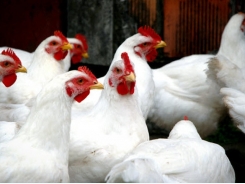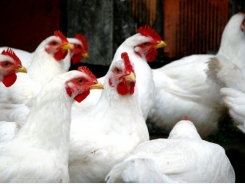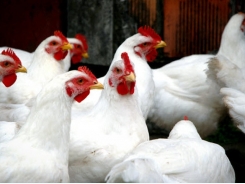Sodium butyrate has benefits for birds with necrotic enteritis: study

Microencapsulated sodium butyrate (MSB) supplementation enhanced intestinal barrier function of broiler birds challenged with necrotic enteritis, finds a Chinese study.
The team published their findings in Animal Feed Science and Technology.
Necrotic enteritis (NE) is an enterotoxigenic disease caused by C. perfringens that results in substantial economic losses to the global poultry industry, noted the authors.
MSB supplementation decreased Clostridium perfringens-induced NE lesions, and C. perfringens intestinal colonization and invasion, said the researchers, based at China Agricultural University in Beijing.
They also found MSB supplementation stimulated intestinal tight junction proteins and antimicrobial peptide LEAP-2 gene expression.
However, the authors stressed the exact mechanisms by which MSB interacts with host intestinal epithelial cells to enhance protective responses to NE need to be further clarified.
Other studies
Butyrate products have been shown in the literature to have an effect on several levels from mucosal barrier to feed passage to microbiota, to immune system to pathogen control and others.
Poultry fed diets supplemented with sodium butyrate (SB) showed improved growth performance (Leeson et al., 2005; Zhang et al., 2011b) and gut morphology; reduced intestinal pathogen colonization and invasion (Leeson et al., 2005; Van Immerseel et al., 2006; Groschwitz and Hogan, 2009; Timbermont et al., 2010; Cerisuelo et al., 2014); and reduced intestinal inflammatory responses (Jerzsele et al., 2012).
Though, there has been little research, said the Chinese team, on the effects of MSB on NE-induced intestinal barrier injury, and the molecular mechanisms involved in this interaction.
Objective
Therefore, they said their objectives in this study were first, to test whether oral supplements of MSB mitigated gut damage in chickens infected with NE, and second, to identify the underlying molecular mechanisms involved in this interaction.
The SB used in their study was 30% sodium n-butyrate coated with plant triglycerides.
Chickens were fed, from hatch, either a diet supplemented with MSB, or with a non-supplemented control diet, and were either left uninfected or orally infected with mixed strains of Eimeria species at 12 d of age, followed by an oral inoculation with C. perfringens at 16, 17, and 18 d of age.
Results
They found the NE-infected chickens fed MSB-supplemented diets had greater body weight (BW), improved average daily gains (ADG), and higher feed conversion ratios (FCR) than NE-infected birds fed unsupplemented diets.
They also saw increased jejunal villus height, reduced duodenal lesion scores, reduced cecal Escherichia coli and C. perfringens counts, and reduced liver C. perfringens load in the NE-infected, MSB-supplemented chickens as compared to the NE-infected, unsupplemented birds.
NE infection downregulated claudin-4, ZO-1, occludin, LEAP-2, and mucin-2 in the jejunum, explained the team.
However, MSB-fed birds infected with NE had significantly upregulated claudin-1, claudin-4, ZO-1, occludin, LEAP-2, and mucin-2 levels in the jejunum as compared with infected birds fed the non-supplemented diet.
“We have thus demonstrated that the administration of MSB alleviates intestinal mucosal barrier injury of broiler chickens infected with NE,” said the Chinese academics.
Further investigation
Tim Goossens, business development manager, at Belgium company, Nutriad, told this publication previously that more investigation is required to determine which butyrate release profiles are linked to a maximal effect on benefits related to gut health such as enhanced digestion.
Such insights would also help ensure butyrate products could be used in a targeted way such as the intestinal development of young animals, or in combating the impact of stressful conditions and during pathogenic challenges, he said.
Livestock producers would benefit from more independent studies, published in peer-reviewed journals, he added.
Related news
Tools

Phối trộn thức ăn chăn nuôi

Pha dung dịch thủy canh

Định mức cho tôm ăn

Phối trộn phân bón NPK

Xác định tỷ lệ tôm sống

Chuyển đổi đơn vị phân bón

Xác định công suất sục khí

Chuyển đổi đơn vị tôm

Tính diện tích nhà kính

Tính thể tích ao



 Regionally relevant probiotic may boost growth, weight gain…
Regionally relevant probiotic may boost growth, weight gain…  New poultry research facility aims to improve bird…
New poultry research facility aims to improve bird…